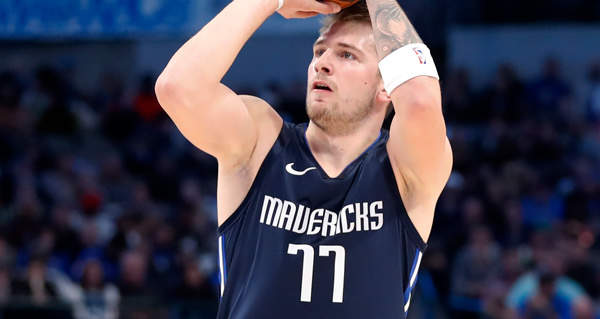A middle-aged Vladimir Nabokov woke up one morning, smoked a half a pack of Pall Malls, and decided to write in uniquely beautiful English for the rest of his life. Francois Truffaut was a miserably disapproving film critic until he picked up a camera and, as if to say let me show you half-wits how it’s done, shot The 400 Blows. Maybe anyone, with enough diligence, can learn to write or make movies or cook or paint or hunt, but there are a small number of fortunate people with a preternatural grasp of the craft itself. They’re just better than you and I; what runs through us only in drips and thin streams is a great white river swelling inside them. Donald Glover wrote “Werewolf Bar Mitzvah” while he was still in college. Et cetera.
Apparently Luka Doncic only needed a year to solve NBA defenses—to figure out how to get around and away from world-class athletes, diagnose traps and fire passes through mazes of limbs, what to do when Rudy Gobert meets you at the rim. We grade players his age on a curve, but that’s not necessary here. He’s not doing well the same way Jaren Jackson and Shai Gilgeous-Alexander are doing well, which is to say for his age, his current success not staggering by itself so much as indicative of the possibility of some future All-NBA production in his mid-to-late 20s. Luka is great right now, performing roughly every bit as well as James Harden and LeBron James at this early but not that early stage of the season. The numbers argue as much and though the Mavericks aren’t legitimate title contenders Luka has carried them to respectability in the same fashion LeBron did with a series of not-terribly-good Cavs teams toward the beginning of his career. This is once-a-decade stuff. There are good young players and there are savants. Some people settle into productive lives and others live as if lucid dreaming.
To argue that any athlete represents an evolutionary endpoint is foolish, because unless you’re discussing a niche model that’s quickly going obsolete—centers like unskilled ogres, defense-first point guards who can’t shoot—you’re likely to be proven wrong somewhere down the line. We will one day meet a more absurdly athletic basketball player than Giannis. We know this because Giannis is a more absurdly athletic version of LeBron, who was at his peak some then-unforeseen hybrid of Vince Carter and Karl Malone.
So Luka is probably not an apotheosis of anything, but he is state of the art, a perfect fit for the modern offensive game. Despite his size, everybody understood him as a primary ballhandler from the moment he entered the league. Rick Carlisle has never told Luka to go the block or the baseline; he just uses him like a six-foot-seven point guard. He doesn’t have a terrifying first step, but that’s less necessary now than it was circa 2002, before the freedom of movement rules made driving past your opponent easier, and the four- and five-out systems teams use today afford him space within the lane that he wouldn’t have had even five years ago. His drives present the same problem LeBron’s and Harden’s do: if your assignment is at the three-point line and Luka’s moving toward the rim, you can either let him go or leave what’s going to be quite a lot of space between you and your man—a six-foot-ten guy who shoots corner threes at a reliable clip because that’s the way things are now. And Luka’s one of the best passers in the league. It’s an impossible predicament.
He can also step back diagonally, like gliding across a checkerboard, and drain it from about 28 feet. That’s a shot that didn’t exist until pretty recently, and he’s devastating with it.
There’s been some fretting among fans and media about whether NBA defense is going extinct, and the short answer is that it obviously isn’t, because there are still really good defenders and really good defensive teams, but the definitions of those things are shifting. You can stop most players, or at least bother them. Others are more or less completely beyond your control.
Checking an all-timer has always involved a degree of capitulation—you admit you’re powerless to stop the skyhook, so you try to make getting the ball to Kareem as difficult as possible—but when attempting to slow a handful of modern stars, there are almost no meaningful choices to make. Like, James Harden would annihilate all shooting records if teams guarded him like Rajon Rondo, but he’s also too twitchy and smart not to foul if you make an effort to get into his personal space. You can double him and play three-on-four. You can be extremely physical with him and hope you’ve landed the right refereeing team. You can dare him to score 60, which he probably will. The brave scientists working for the Utah Jazz have already discovered that guarding the space directly behind him doesn’t work. That might be where the innovation ends and the praying begins.
Luka appears to belong in Harden’s phylum at age 20. It feels like a cosmic law that he should hit a rough patch at some point this year, in which he doesn’t look as thoroughly in control as he has through the opening quarter of the season, and maybe he will, but we all know where this is headed because of what it already is. This sudden, premature breakout is the product of a confluence of factors, all legible enough, and then something else inexplicable. Some people settle into productive lives and some people don’t seem like people. We all strive and stumble and here they’ve arrived where we know we couldn’t get to even with decades of effort. Luka Doncic’s unfairness is myriad, but that is perhaps the most unfair thing about him. It’s so early for him to be so great, and of course he doesn’t seem to notice.



